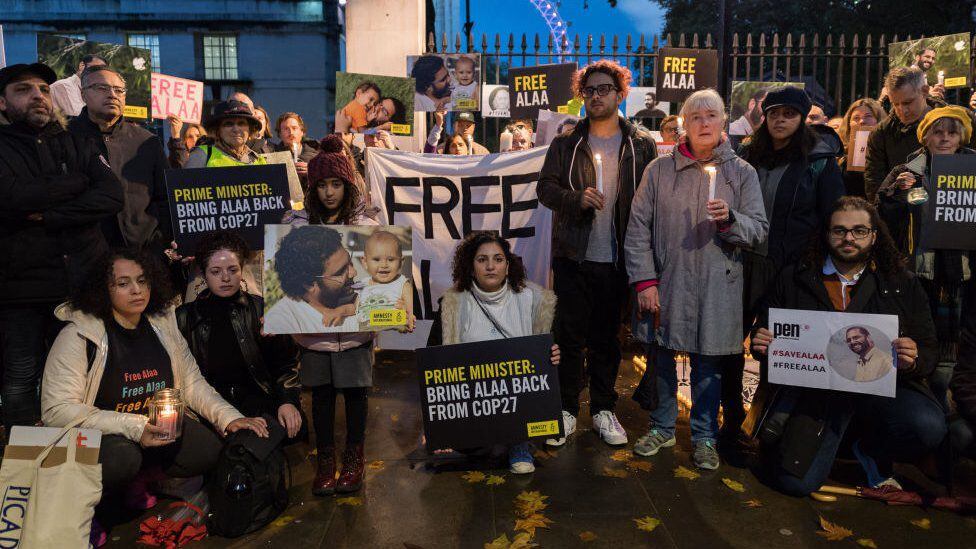Milk, honey and tea. For 218 days it was the only thing she consumed Alaa Abdel Fatahprobably the most famous political prisoner of Egyptsince he began a hunger strike in protest at his conviction.
On Sunday the 6th, while leaders from all over the world arrived in the city of Sharm el-Sheikh to participate in the 27th UN Conference on Climate Change (COP27), Abdel Fatah decided to radicalize his protest.
LOOK: COP27 begins in Egypt and approves discussing a fund for the effects of climate change
Since that day, the 40-year-old man only consumes water. His family has expressed concern after the prison authorities told them that Abdel Fatah was “under medical treatment” without providing further details and, later, the Prosecutor’s Office issued a statement assuring that “you do not need to be transferred to a hospital” because he enjoyed “good health”.
Mona Seif, sister of the prisoner, has branded “lie” the version of the Prosecutor’s Office and ensures that the Egyptian authorities “they will say that he is not on a hunger strike, they will put him on his feet in secret so that he does not die at their hands and they will not let anyone see him”.
But who is Alaa Abdel Fatah, why is he in jail and how is his case causing growing international pressure on the Egyptian government?
several times imprisoned
Born on November 18, 1981 in Cairo, Alaa Ahmed Seif Abdel Fatah grew up in a family full of political activists, including his parents, who took an active role in the demonstrations against former President Anwar Sadat and, in 2005, against dictator Hosni Mubarak.
Abdel Fatah was trained as a software developer and designed various platforms and programs in Arabic. This last decade, however, his life was marked by his political activism and the consequences of his participation in different mobilizations.
He was imprisoned in the years 2006, 2011, 2013, 2015, 2019 and, finally, in 2021. In most cases he was accused of organizing anti-government protests, including those that took place in the so-called Arab Spring of 2011 that led to Mubarak’s overthrow.
The work he did in this last event, disseminating information through social networks and independent platforms, made him one of the most well-known faces of the revolution.
accused of misinformation
In December 2021, Abdel Fatah was sentenced to five years in prison for “spread false information” in a trial that Amnesty International (AI) described as “extremely unfair”.
According to the human rights organization, the reasons why Abdel Fatah was sentenced are his active political role and his work in defense of rights. For this reason, he considers him a prisoner of conscience or political persecution.
AI has warned that this condition would cast doubt on the information released by the Egyptian government on Abdel Fatah’s condition.
AI Secretary General Agnes Callamard has warned that Abdel Fatah may only have 72 hours to live, and has also demanded his release, reports a BBC article.
international pressure
Abdel Fatah’s case has sparked a wave of protests in the midst of COP27, an event that Egypt hoped would help improve its international image and reverse the questioning of human rights treatment in that country.
The African nation ranks 168th out of 180 in the 2022 press freedom ranking prepared by the NGO Reporters Without Borders.
Last Sunday, when the summit was inaugurated, hundreds of participants dressed in white garments that resembled those used by prisoners and shouted “Free everyone!”, in addition to disseminating various calls to demonstrate in the country through social networks.
Furthermore, on Monday the 7th, three Egyptian journalists announced that they were going on a hunger strike to show their support for Abdel Fatah’s unjust situation.

But the pronouncements have not been limited to the civil and media plane. The national security adviser to US President Joe Biden, Jake Sullivan, expressed the “deep concern” from his government over the case and called for Abdel Fatah’s release.
The new British Prime Minister, Rishi Sunak, sent a letter to Abdel Fatah’s family in the days before the start of COP27 announcing his intention to negotiate the activist’s release with the Egyptian government. This Friday the 11th Sunak is expected to meet with his Egyptian counterpart Abdelfatah El-Sisi to address the issue.
However, in the last few hours the activist’s family has increased the pressure, assuring that Abdel Fatah might not survive the end of the summit due to his situation and demanding that talks for his release be accelerated.
Other political prisoners
Despite the fact that from Cairo they assure that there are no political prisoners in the country, different organizations have documented numerous cases that seem to bring down the official version.
It is estimated that there are up to 60,000 prisoners of conscience in Egypt. AI, for its part, details that since the North African nation reactivated its presidential pardon commission in April this year, 766 prisoners of conscience have been released but at least 1,540 remain in detention.
“The international community cannot continue to be passive when Alaa is in danger of being tortured and even killed. This would be a great stain on the reputation of diplomacy and an indication of the cost of not putting human rights at the center of diplomatic activity.Amnesty International warned in a statement.
Source: Elcomercio
I, Ronald Payne, am a journalist and author who dedicated his life to telling the stories that need to be said. I have over 7 years of experience as a reporter and editor, covering everything from politics to business to crime.

:quality(75)/cloudfront-us-east-1.images.arcpublishing.com/elcomercio/KTHB5PZQYFBY3JWBLTIIOHPDRM.jpg)

:quality(75)/cloudfront-us-east-1.images.arcpublishing.com/elcomercio/CBPCX6OQ6VDTTDCMCTGZFCXOKE.jpg)
:quality(75)/cloudfront-us-east-1.images.arcpublishing.com/elcomercio/R3BFGYGHNBENTF2OR7JTO7S67U.jpg)

:quality(75)/cloudfront-us-east-1.images.arcpublishing.com/elcomercio/ZVZ5SOAA2ZAE5P42JPKUM65ZFI.jpg)
